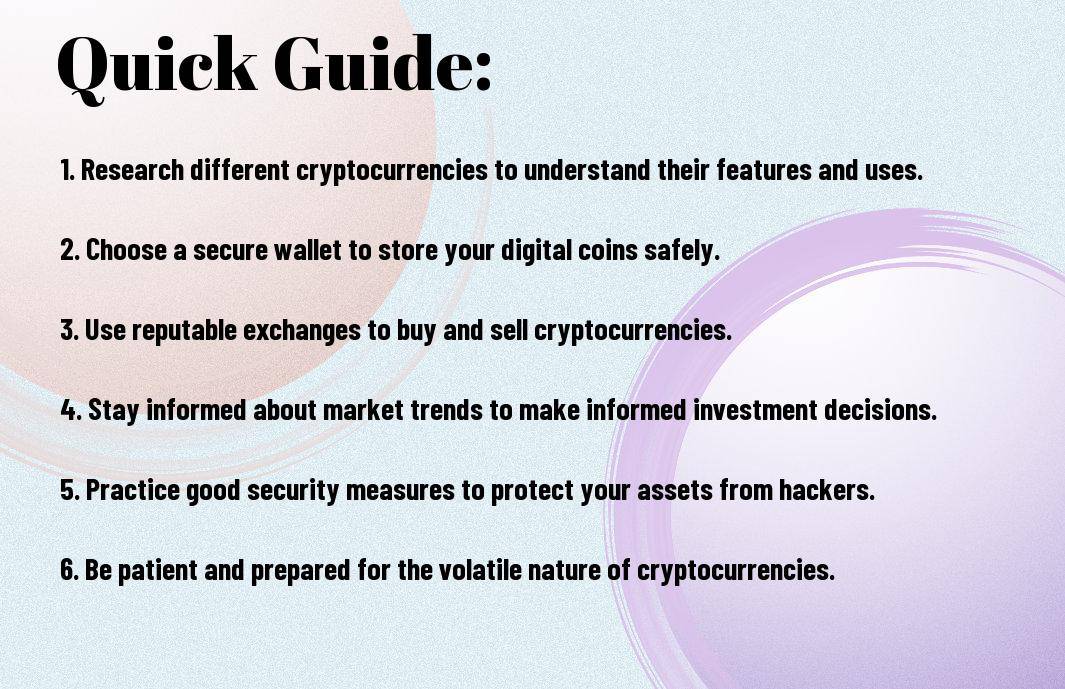
Newsletter Subscribe
Enter your email address below and subscribe to our newsletter

Enter your email address below and subscribe to our newsletter

Cryptocurrency 101! If you’ve been hearing about cryptocurrencies like Bitcoin, Ethereum, and others and are curious to learn more, you’ve come to the right place. In this beginner’s guide, we will cover the fundamentals of digital coins and how they work in the world of finance. Cryptocurrencies have revolutionized the way we think about money, offering a decentralized and secure way to transfer value over the internet. However, with great potential also comes risks that every newcomer should be aware of. Let’s investigate the world of digital coins and demystify this rapidly evolving space.


For those new to the world of cryptocurrency, understanding blockchain technology is vital. Blockchain is vitally a decentralized and distributed digital ledger that records transactions across many computers. This technology ensures that transactions are secure, transparent, and immutable. Each block in the chain contains a number of transactions, and once verified, it is added to the previous blocks, hence the name blockchain.
For beginners in the cryptocurrency space, becoming familiar with key terms and concepts is crucial for navigating this complex landscape. Some vital terms to know include: cryptocurrency, wallets, mining, exchanges, and private keys. Cryptocurrency refers to digital or virtual currency that uses cryptography for security. Wallets are secure digital tools used to store, send, and receive cryptocurrencies. Mining is the process of validating transactions and adding them to the blockchain through computational power, while exchanges are platforms where cryptocurrencies can be bought and sold. Private keys are unique codes that provide access to your cryptocurrency holdings.
This foundational knowledge will help you grasp the underlying principles and mechanisms of cryptocurrencies. It is important to familiarize yourself with these terms to make informed decisions and protect your investments in the crypto space. By understanding these key concepts, you can navigate the world of cryptocurrencies more confidently and securely.

Unlike traditional currency, cryptocurrency operates using a decentralized system. There are several different types of cryptocurrencies, each with its own unique features and functions. Understanding the various categories can help you navigate the complex world of digital coins more effectively.
| Bitcoin | Altcoins |
| Tokens | Stablecoins |
| Privacy Coins | Security Coins |
On January 3, 2009, Bitcoin was introduced by an unknown person or group of people under the pseudonym Satoshi Nakamoto. It is the first and most well-known cryptocurrency, often referred to as digital gold. Bitcoin operates on a decentralized network called blockchain, which ensures secure and transparent transactions.
Any individual can participate in Bitcoin transactions by mining or buying and selling coins. The total supply of Bitcoin is capped at 21 million, making it a deflationary asset with a finite quantity.
Now, altcoins refer to all cryptocurrencies other than Bitcoin. These coins were developed to address specific limitations of Bitcoin, such as scalability and transaction speed. Popular altcoins include Ethereum, Ripple, and Litecoin.
Altcoins offer various features like smart contracts, which allow self-executing contracts with the terms of the agreement directly written into code. They also focus on different consensus algorithms for mining and validating transactions, providing a diverse ecosystem of digital assets.
Ethereum, a decentralized platform that enables smart contracts and decentralized applications (dApps), introduced the concept of tokens. For instance, tokens can represent assets, voting rights, or access to services within a specific blockchain ecosystem. These tokens can be categorized as utility tokens, which provide access to a product or service, or security tokens, which represent ownership in a company.
The issuance of tokens is often done through Initial Coin Offerings (ICOs) or Security Token Offerings (STOs), enabling projects to raise funds by selling digital assets to investors.
Types of stablecoins are cryptocurrencies designed to minimize price volatility by pegging their value to a stable asset like the US dollar or gold. The stable value makes them more suitable for everyday transactions and storing value without the risk of significant price fluctuations.
The stability of stablecoins bridges the gap between the traditional financial system and the cryptocurrency world, providing a seamless transition for users looking to adopt digital assets.

Once again, you’ve decided to take the plunge into the world of cryptocurrency. The first step in this journey is setting up a digital wallet to securely store your coins.
| Step 1: | Create an account with a reputable cryptocurrency wallet provider. |
| Step 2: | Generate your unique wallet address. This address is like your account number and is used to send and receive coins. |
Some cryptocurrency exchanges are more reputable and secure than others. When selecting an exchange to buy or trade coins, consider the following tips:
This process may seem daunting at first, but by following these tips, you can ensure a smoother and more secure experience in the world of cryptocurrency trading.
With the rise of cryptocurrencies, understanding how transactions work in this digital realm is crucial.
Step-by-step transactions involve the transfer of coins from one wallet to another. This process is facilitated by the blockchain, a decentralized ledger that records all transactions securely and transparently.
Right from the moment you initiate a transaction to its confirmation on the blockchain, understanding the intricacies of cryptocurrency transactions is imperative. Remember to prioritize security and accuracy in all your transactions while exploring the exciting world of digital currencies.
Keep in mind the following factors before investing in cryptocurrency:
Little can prepare you for the extreme market volatility that comes with cryptocurrency investing. Prices can swing dramatically within minutes, which can lead to significant gains or losses. It is crucial to have a high tolerance for risk and to only invest what you can afford to lose. Make sure to educate yourself on risk management strategies and stay updated with the latest news and trends in the market. For more insights on handling cryptocurrency market volatility, you can check out Crypto 101: A Beginner’s Guide.
Consider the regulatory environment surrounding cryptocurrency investments in your country. Regulations can vary significantly from one place to another, impacting the legality and security of your investments. Stay informed about the latest regulatory developments and choose compliant platforms for trading and storing your digital coins. After all, it is imperative to prioritize legality and compliance in your cryptocurrency investments.
Now, let’s investigate into another critical aspect of cryptocurrency success:
Market sentiment, community engagement, and project development are vital elements that contribute to the success or failure of a cryptocurrency. A strong and supportive community can drive adoption and value appreciation. On the other hand, a lack of development progress or community interest can lead to stagnation or decline in a digital asset‘s market value. Engage with the community, follow project updates, and assess the long-term potential for growth in a cryptocurrency project.
Market speculations aside, community involvement and development progress play a crucial role in determining the sustainability and success of a cryptocurrency. Stay informed and actively participate in community initiatives to better understand the digital asset you are investing in.
Now, let’s examine into the pros and cons of investing in cryptocurrencies to help you make more informed decisions in the digital asset space.
| Advantages | Disadvantages and Risks |
| 24/7 Trading | Volatility |
| Diversification Opportunities | Lack of Regulation |
| Potential High Returns | Security Concerns |
| Accessibility | Scams and Fraud |
| Blockchain Technology | Liquidity Issues |
| Global Reach | Market Manipulation |
| Transparency | Technological Challenges |
| Lower Fees | Investment Risks |
| Financial Inclusion | Uncertainty in Value |
While investing in cryptocurrencies comes with risks, there are several advantages to consider. Cryptocurrencies offer 24/7 trading, providing flexibility for investors around the clock. Additionally, they present diversification opportunities, allowing you to spread your investment across different assets to manage risk better. Furthermore, the potential for high returns in the crypto market can be attractive to those seeking significant growth in their portfolio.
While investing in cryptocurrencies can be rewarding, it’s vital to be aware of the potential disadvantages and risks associated with digital assets.
While the market for cryptocurrencies is known for its volatility, it’s crucial to understand that investments in digital coins can be subject to significant price fluctuations. Furthermore, the lack of regulation in the crypto space can expose investors to scams and fraudulent activities. It is vital to exercise caution and conduct thorough research before investing. Additionally, security concerns, such as the risk of cyber attacks and hacking, are prevalent in the cryptocurrency world and require careful risk management strategies.
Advantages and disadvantages aside, investing in cryptocurrencies can be a lucrative opportunity for those who understand and navigate the market effectively. It’s vital to stay informed, exercise caution, and keep abreast of the latest developments to make informed investment decisions in the ever-evolving world of digital currencies. For more in-depth information on cryptocurrency basics, check out Cryptocurrency 101: Understanding Digital Currencies.
Not everyone in the crypto space has your best interests at heart. As you investigate into the exciting world of digital coins, it’s crucial to prioritize security. To learn more about the fundamentals of cryptocurrency, check out Cryptocurrency 101: A Beginner’s Guide to the World of Digital Money.
Assuming you’ve decided to invest in cryptocurrencies, it’s vital to implement best practices for safeguarding your investments. Make sure to store your coins in secure wallets, preferably hardware wallets, to protect against hackers and cyber threats. Additionally, enable two-factor authentication on your accounts and never share your private keys or passwords with anyone.
Avoid falling prey to scams by staying vigilant and informed. Scammers often target newcomers in the crypto space, promising unrealistic returns or posing as reputable exchanges. It’s crucial to verify the legitimacy of platforms and projects before investing. If something seems too good to be true, it probably isn’t.
For instance, be wary of unsolicited messages or emails asking for personal information or investments. Only interact with verified sources and double-check URLs to ensure you’re on the correct website. Educating yourself on common scam tactics and staying cautious can go a long way in protecting your hard-earned money in the cryptocurrency world.
Hence, this beginner’s guide has provided you with a foundational understanding of cryptocurrency. You have learned about the basic concepts, the technology behind digital coins, and the various types of cryptocurrencies available in the market. By grasping these fundamental principles, you are now equipped to navigate the world of cryptocurrency with more confidence and knowledge.
Do not forget, the cryptocurrency space is constantly evolving, so staying informed and conducting thorough research is key to success. Embrace this new era of digital finance with an open mind and a willingness to learn, and you will be well on your way to becoming a savvy cryptocurrency investor or user.
A: Cryptocurrency is a digital or virtual form of currency that uses cryptography for security, making it difficult to counterfeit. It operates independently of a central authority, such as a government or bank.
A: Cryptocurrency works through a technology called blockchain, which is a decentralized public ledger of all transactions. When a transaction is made, it is recorded on a block and added to the chain, creating a permanent record.
A: A blockchain is a decentralized, distributed ledger that records all transactions across a network of computers. It ensures transparency, security, and immutability of data in cryptocurrency transactions.
A: Cryptocurrencies are stored in digital wallets, which can be online, hardware-based, paper-based, or software-based. Each wallet has a public address and a private key for security and access to the funds.
A: Bitcoin is the most well-known and widely used cryptocurrency. It was the first to be created and remains the most valuable in terms of market capitalization.
A: Cryptocurrency can be acquired through online exchanges, where you can buy, sell, and trade digital coins using fiat money or other cryptocurrencies. You can also earn cryptocurrency through mining or as payment for goods and services.
A: Cryptocurrency can be a volatile and speculative investment. While some people have made significant profits, there are also risks involved, such as market fluctuations, regulatory changes, and security breaches. It is vital to do thorough research and understand the risks before investing.
Blockchain for Beginners – A Simple Guide to the Most Disruptive Tech